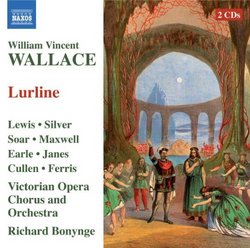| All Artists: Wallace, Bonynge, Lewis, Ferris, Soar Title: Lurline Members Wishing: 0 Total Copies: 0 Label: Naxos Original Release Date: 1/1/2010 Re-Release Date: 6/29/2010 Genre: Classical Style: Number of Discs: 2 SwapaCD Credits: 2 UPC: 730099029377 |
Search - Wallace, Bonynge, Lewis :: Lurline
 | Wallace, Bonynge, Lewis Lurline Genre: Classical
|
Larger Image |
CD DetailsSimilar CDs |
CD ReviewsA Victorian Classic Revived David Chandler | 07/02/2010 (5 out of 5 stars) "For about 300 years the British have had an extraordinary inferiority complex concerning British opera. One result was that even British operas which proved very successful in their day were often quickly dropped from the repertoire in a sort of knee-jerk reaction in favour of the foreign product. This led, in turn, to enormous gaps in the recorded heritage, and no period has been more comprehensively neglected than the century or so before the Gilbert and Sullivan partnership was established in the 1870s. The British treatment of this period is, needless to say, completely at odds with the Italian, German, French, or Russian celebration of it.
For the earlier half of this neglected century there is some excuse--very few operas survive in full score, and only a lot of reconstruction can make them performable today. For the later half, however, most of the once-famous operas can be recovered without excessive difficulty, and thankfully a sustained effort to recover them is finally being made. We have the British-based Victorian Opera company to thank for this; they have already recorded Balfe's "Maid of Artois" (2005), and are intending to release G. A. Macfarren's "Robin Hood" in the next few months. To the best of my knowledge the two releases made so far have already doubled the number of commercially-available British operas from the 1825-75 period. They join Richard Bonynge's pioneering recording of "The Bohemian Girl" (1991) (probably still the best starting point for anyone who thinks they might like this repertoire), and a recording of Wallace's "Maritana" (1995). Taken altogether these recordings show that British opera of this period was, if well short of the British novel, nevertheless a considerable artistic achievement. Both Balfe and Wallace commanded international respect in their own day--indeed the present opera, "Lurline," was originally commissioned for the Paris Opera (remarkably). Berlioz, no less, described Wallace as "a dramatic composer of rare value" and found "Lurline" "a fantastic, graceful opera." Of the four British operas from the period 1825-75 now available on CD, "Lurline" is much the most ambitious. It is the only one that is all-sung, and it made extraordinary scenic demands, on a par with Wagner's "Ring" cycle, to which it is related at the thematic level. These scenic demands, which include "The Crystal Dwelling of Lurline" beneath the Rhine, are unfortunately unlikely to ever be realised in a theatre now, unless through skillful use of projected images. But Wallace's evocative music, and some original production illustrations reproduced in the booklet, allow one to relive this extraordinary Victorian show in the theatre of the mind. Wallace's subject in "Lurline" is the well-known Loreley legend, here combined with the story of the Rhine gold (a connection not made in Germany until much later). Loreley was a favourite subject with nineteenth century opera composers (there were nearly twenty versions), not surprisingly, as the story is very much about the seductive and destructive power of music. But the legend of the beautiful siren is so far short of an operatic plot that it proved a fatal snare to many a composer and librettist. The only version to retain a toehold in the modern operatic repertoire is Alfredo Catalani's "Loreley" of 1890 (Catalani's second attempt at the subject), a favorite opera of this reviewer, and Catalani's decision to employ several librettists produced a libretto that is at least better than the others, though it has moments of pure silliness. Edward Fitzball's libretto for Wallace, written in the 1840s, unfortunately might be said to have few moments that are not silly. It was denounced by Bernard Shaw as "desperate trash." Fitzball responded to the dramatic thinness of the legend, not by developing its "human" and psychological interest, but by padding it out with just about everything that ingenuity could devise, including a drinking song and a hunting song. There is no doubt that it would have been a great spectacle, and it was enormously popular when it premiered in 1860; but it is hard to feel an interest in the fate of any of the characters. Given this, though, one can only admire Wallace's music, which deserves better words. For the most part he seems to have managed to avoid being distracted by Fitzball's irrelevancies, and to have kept his eye on the primal themes of beauty, danger, desire and loss inherent in the original legend. This resulted in music of great lyrical beauty, slightly less memorable than the big numbers in "Maritana," but much more integrated into a larger musical conception. There are also many stunning choruses, which show Wallace in complete command of his extensive musical resources. The complete two and a half hour opera, economically squeezed onto 2 discs, maintains a consistently high inspiration, with occasional "rapt" moments that seem to leave the ordinary world far below. Richard Bonynge, one of the best friends this neglected nineteenth century repertoire has ever had, conducts everything with his customary aplomb and sensitivity. The Victorian Opera Chorus and Orchestra perform with the sort of commitment and passion that comes from a belief in what is being done, and the principals are generally excellent, though in some cases more could have been done to introduce character into the voice. Sally Silver as Lurline is outstanding casting: her beautiful, silvery (sorry!), rather ethereal soprano seems absolutely perfect for the role. Altogether, as this recording is available at a giveaway Naxos price, it should be an essentialy acquistion for anyone who has ever wondered what happened to British opera between Purcell and Sullivan, or simply interested in Victorian theatre and culture, or indeed the Loreley legend. " |

 Track Listings (27) - Disc #1
Track Listings (27) - Disc #1

